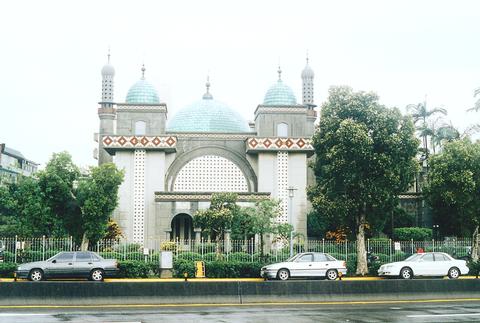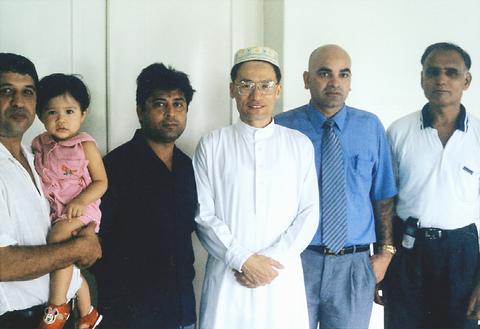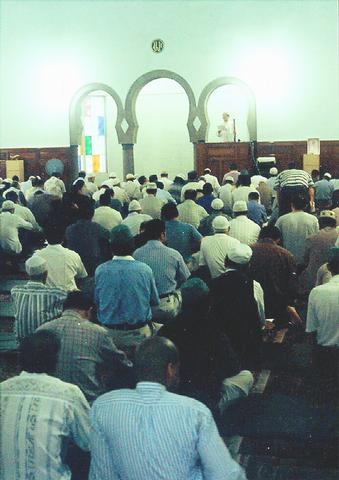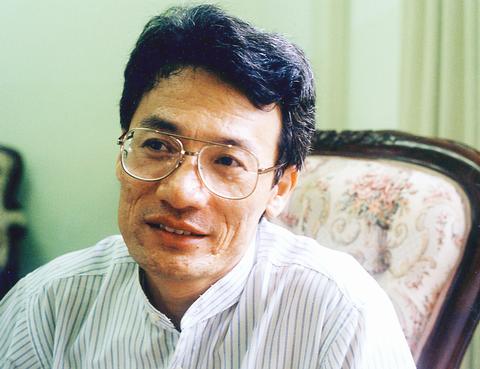Above the urinals in the men's room of the Taipei Grand Mosque there are several signs posted to remind Muslims of what the Islamic doctrine says about urination from a standing position. According to the religion, the practice soils both "cloth and shoes" and destroys the salat, or prayer. Thus the signs' final admonition is, "Please use the toilets."
One Senegalese Muslim who has attended prayers at the mosque for several months since he last arrived in Taiwan describes the Islam practiced there as "very orthodox." Bathing facilities are provided for purification before prayers; prayer areas for men and women are divided to prevent distractions in worship; women who come to pray do not wear veils, but do wear clothes that cover all but their faces and hands; and more signs warn against bringing non-Islamic food, such as pork, inside. Mosque-goers, most of them male, are also uniformly insistent about purity in behavior, believing in abstinence from alcohol and the sinfulness of sex outside of marriage.

PHOTO: DAVID FRAZIER, TAIPEI TIMES
Historical legacy

PHOTO: DAVID FRAZIER, TAIPEI TIMES
As a monument, the Taipei Grand Mosque is both a legacy of Chinese Muslims who emigrated to Taiwan with Chiang Kai-shek's armies and Saudi support for the spread of Islam. Located on Taipei's Hsinsheng South Road across from Ta-an Park, the structure of domes and minarets was built in 1960 by a local Islamic community with assistance from Saudi Arabia, which even today remains a major source of financial support for Taipei's main Islamic center of worship.
Ties between the mosque and Saudi Arabia, the nation in which Islam was founded, have been strong throughout its entire 41-year history. Visiting Saudi imams preach in the mosque each year during Ramadan, and many of the mosque's past homegrown imams have traveled to Saudi Arabia to learn Arabic and undertake religious studies. In several instances, Taiwanese imams have also spent part of their careers in Taiwan's diplomatic service in Saudi Arabia. In 1971, Taipei's Grand Mosque was even visited by Saudi's King Faisal.

PHOTO: DAVID FRAZIER, TAIPEI TIMES
At present, the worship center serves as a meeting point for expatriate Muslims from all over the world. According to Ishag Ma (

Although the two groups predominate on the island, Friday prayers at the Taipei mosque draws a more international audience, including Muslims from the Sudan, Senegal, South Africa, Ghana, Pakistan, Thailand, India, Turkey, the US and several other nations. This event is the weekly focal point of their spiritual activity and includes group prayers and lessons from the imam in both Chinese and Arabic. It draws around 300 worshippers on a typical Friday and as many as 1,000 during Ramadan.
Coming to unite in prayer to Allah, this sampling of the Islamic world joins a small contingent of elderly ethnic Chinese. Taken as a whole, the group is a fair picture of the diversity to be found in the world's 1.2 to 1.6 billion Muslims (estimates vary, but generally fall within this spectrum).
"There are no divisions in Islam," said Ma, in regard to the compatibility of Muslims from so many traditions for worshipping together under one roof.
Nevertheless, he also discounted non-Sunni Muslims, such as Shi'ites, as unorthodox sects. Sunnis account for the vast majority of Muslims the world over.
The atmosphere in the mosque is generally warm and welcoming to both Muslims and non-Muslims alike. Though non-Muslims are not allowed in the prayer hall, they are allowed to observe worship from just outside its doors. Strangers are met with smiles, friendly handshakes, and the traditional greeting of "al salam alaikum."
Classes in Arabic are also open to outsiders.
Responding to terror
Yet in light of recent events, the mosque is also pervaded with a certain undecided consciousness of how Muslim identity has been affected by the September 11 terrorist attacks on the US.
Such feelings come out in offhand comments, like one made by Mesut Temel, a Turk who joked that he might be more popular with Westerners now, since he shared the name of the recently assassinated leader of Afghanistan's Northern Alliance, Ahmed Shah Massoud. "Mesut and Massoud, in Arabic it's the same," he explained.
As the mosque boasts a diversity of Muslims, it also contains a diversity of views on current world tensions. In regard to the suicide bombings in the US, most expressed sentiments similar to those in the mosque's official statement, posted by Ma and mosque chairman Ting Nai-hsin (
The statement further emphasized that Islam is a religion of peace, that a few terrorists do not represent Islam and should not be seen as doing so, and that Islam shares much of its history and values with Christianity and Judaism.
Many at the mosque, like Temel, carry even stronger opinions. "There is no religion anywhere that could support this kind of thing," he said of the bombings in New York and Washington, DC.
Of the hijackers, Ajaz, an Indian Muslim, said, "They are not Muslims. Muslims can not be terrorists, and terrorists can not be Muslims."
Atilla Kahveci, a teacher from Turkey, said, "Suicide is one of the biggest sins in Islam. Trying to express a point of view in a violent way is not the Islamic way."
On the first Friday following the terrorist attacks against the US, Ma addressed such issues, delivering his weekly lesson on the theme, "What is jihad?" In his sermon, he equated jihad not with "holy war", as it is often translated, but with the Chinese words for hard work or striving (
"Jihad is personal," he said. "If people are doing immoral things, you need to tell them. You should not attack [them], you should use your mouth."
Complex responses
But while Ma denounces violence, including any potential retribution by the US, he is hesitant to assess blame for the traumatic events of mid-September or take critical positions against other Muslim groups, including the Taliban and Osama bin Laden.
When approached on such topics, he is generally eager to turn the conversation in other directions, including the peaceful conduct advocated by Muhammad, Islam's major prophet, and Islamic culture's tight focus on an ordered, moral society.
On a deeper level, however, he and many others at the mosque find trouble viewing the recent acts of violence against America without linking them to other concerns related to challenges to their faith. The mosque's statement about the September 11 attacks averred that "the hijackings and crash attacks on the World Trade Center buildings were extremely shocking. But almost as worrisome are `American products,' like movies, that reappear in the real world."
Several at the mosque echoed the statement with concerns about how media, especially Western media, broadcasts a bombardment of messages at odds with their religious beliefs. Paramount among these worrisome signals, said one man from Sri Lanka who declined to give his name, are the glorification of drinking alcohol and casual attitudes toward sex.
"I can't send my kids to school here [in Taiwan]. What they teach is what I am opposed to in every way," he said.
Ma elaborated on the cultural friction, saying that Western individualism admits much behavior that Islamic collectives find unacceptable. As examples, he mentioned homosexuality, abortion and sex before marriage.
"Islam says these are immoral. The West says this is freedom," he said.
Also a source of tension that a few people at the mosque could not help mentioning was "the Palestine problem." Specifically, Ma cited Palestine's millennia-old territorial dispute with Israel, while one or two others broached their bitterness at US support for Israel, which is compounded by Israeli troops' continued shedding of Palestinian blood.
Agitated by such topics, the man from Sri Lanka went so far as to threaten this reporter, who is American, saying, "You are safe in the mosque today, but if there is an attack, you better watch out. Then you must go back. Out of Taiwan. You will not be allowed to stay here."
Soon afterwards, others from the mosque told me that this man's views were found abhorrent by many of his fellow Muslims. They implored me to disregard him. He was only one bad apple, they said, and only a few ever listened to him.
One such voice came from Kahveci, who said, "Muslims are like everybody else. We do not support violence in any form. All we want is peace."

Towering high above Taiwan’s capital city at 508 meters, Taipei 101 dominates the skyline. The earthquake-proof skyscraper of steel and glass has captured the imagination of professional rock climber Alex Honnold for more than a decade. Tomorrow morning, he will climb it in his signature free solo style — without ropes or protective equipment. And Netflix will broadcast it — live. The event’s announcement has drawn both excitement and trepidation, as well as some concerns over the ethical implications of attempting such a high-risk endeavor on live broadcast. Many have questioned Honnold’s desire to continues his free-solo climbs now that he’s a

As Taiwan’s second most populous city, Taichung looms large in the electoral map. Taiwanese political commentators describe it — along with neighboring Changhua County — as Taiwan’s “swing states” (搖擺州), which is a curious direct borrowing from American election terminology. In the early post-Martial Law era, Taichung was referred to as a “desert of democracy” because while the Democratic Progressive Party (DPP) was winning elections in the north and south, Taichung remained staunchly loyal to the Chinese Nationalist Party (KMT). That changed over time, but in both Changhua and Taichung, the DPP still suffers from a “one-term curse,” with the

Jan. 26 to Feb. 1 Nearly 90 years after it was last recorded, the Basay language was taught in a classroom for the first time in September last year. Over the following three months, students learned its sounds along with the customs and folktales of the Ketagalan people, who once spoke it across northern Taiwan. Although each Ketagalan settlement had its own language, Basay functioned as a common trade language. By the late 19th century, it had largely fallen out of daily use as speakers shifted to Hoklo (commonly known as Taiwanese), surviving only in fragments remembered by the elderly. In

Lines between cop and criminal get murky in Joe Carnahan’s The Rip, a crime thriller set across one foggy Miami night, starring Matt Damon and Ben Affleck. Damon and Affleck, of course, are so closely associated with Boston — most recently they produced the 2024 heist movie The Instigators there — that a detour to South Florida puts them, a little awkwardly, in an entirely different movie landscape. This is Miami Vice territory or Elmore Leonard Land, not Southie or The Town. In The Rip, they play Miami narcotics officers who come upon a cartel stash house that Lt. Dane Dumars (Damon)